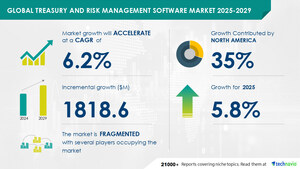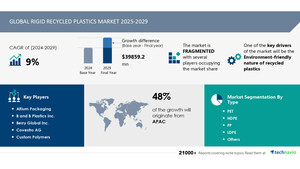NEW YORK, April 16, 2024 /PRNewswire/ -- The global probiotic cosmetic products market size is estimated to grow by USD 560.72 mn from 2023 to 2027, according to Technavio. The market is estimated to grow at a CAGR of over 5.32% during the forecast period. North America held the largest share of the global market in 2022, and the market in the region is estimated to witness an incremental growth of 34%.
For more insights on the historic (2017 - 2021) and forecast market size (2023-2027) - Request a sample report. To understand more about this market- Download a FREE Sample Report in minutes!
North America is expected to play a pivotal role in propelling the global probiotic cosmetic products market
Geographic Landscape:
The Probiotic Cosmetics Market in North America is experiencing significant growth in 2022, driven by the increasing demand for innovative, natural, and organic beauty products. Key factors include the rise of acne and anti-acne products, anti-aging solutions, and multifunctional items. Probiotic cosmetics, which utilize bacteria such as Bifidobacterium and Lactiplantibacillus, offer benefits for various skin concerns, including fine lines, wrinkles, and acne. These microorganisms help address chronic inflammation, eczema, and uneven skin tone. Conscientious consumers, particularly millennials, seek personalized skincare solutions with sustainable production processes and a focus on holistic well-being. The market expansion is influenced by the International Labor Organization's female working population and the organic skincare industry's shift towards prebiotics and probiotics. Probiotic moisturizers and formulations provide anti-pollution benefits, addressing the environmental impact on skin health. Overall, the market's growth is fueled by consumers' desire for improved appearance, overall health, and species Lactobacillus's role in skin care products.
Research Analysis
The Probiotic Cosmetic Products market is experiencing significant growth, particularly among conscientious consumers, including the Female working population and Millennials. These consumers prioritize overall health and wellness-focused lifestyles, leading them to seek out Anti-acne, Anti-ageing, and Anti-pollution products with multi-functionality. Probiotics skincare, which utilizes beneficial bacteria like Vitreoscilla and ferments, has gained popularity due to its ability to combat chronic inflammation and improve the appearance of the skin. As the organic skincare industry continues to expand, there is a growing demand for probiotic cosmetics with natural ingredients and environmentally-friendly production processes. Brands like TULA Skincare are leading the charge in this market, offering products that not only address skin concerns but also consider the environmental impact. Consumers with conditions such as eczema are also turning to probiotic cosmetics for their potential therapeutic benefits. With disposable income to spend on skincare, these consumers are driving the market forward, making probiotic cosmetics a must-watch trend in the skincare industry.
Market Drivers
The Probiotic Cosmetics Market is experiencing significant growth due to the increasing demand for personalized skincare solutions that address multiple beauty concerns efficiently. Vendors are innovating by introducing probiotic-infused skincare products, which combine the benefits of probiotics, antioxidants, and other natural ingredients. Probiotics, such as Lactobacillus and Bifidobacterium, are particularly effective in improving skin health by combating chronic inflammation, acne, eczema, and signs of aging. Production processes prioritize sustainability, with brands like TULA Skincare and Vitreoscilla leading the way. Consumers, particularly working women with disposable income and wellness-focused lifestyles, seek prebiotic and probiotic skincare to enhance their personal appearance. The market extends beyond anti-acne and anti-aging products to include anti-pollution solutions, catering to the needs of conscientious consumers concerned about the environmental impact of their skincare choices.
Market Overview
The Probiotic Cosmetic Products market is a significant segment in the beauty industry, utilizing the benefits of probiotics for skin health. Antibacterial and anti-aging properties are key features of these products, produced through the use of Lactic and Bifidobacterium cultures. Probiotic cosmetics can be found in various forms, including lotions, face masks, and serums. These products protect and enhance the skin, improving its overall appearance and resistance to environmental stressors. Consumers seek out Probiotic Cosmetics for their eco-friendly and natural benefits, as they contain no harsh chemicals or synthetic preservatives. The market for these products is projected to grow, driven by increasing consumer awareness and demand for natural and effective skincare solutions.
To understand more about this market- Download a FREE Sample Report in minutes!
About Technavio
Technavio is a leading global technology research and advisory company. Their research and analysis focuses on emerging market trends and provides actionable insights to help businesses identify market opportunities and develop effective strategies to optimize their market positions.
With over 500 specialized analysts, Technavio's report library consists of more than 17,000 reports and counting, covering 800 technologies, spanning across 50 countries. Their client base consists of enterprises of all sizes, including more than 100 Fortune 500 companies. This growing client base relies on Technavio's comprehensive coverage, extensive research, and actionable market insights to identify opportunities in existing and potential markets and assess their competitive positions within changing market scenarios.
Contacts
Technavio Research
Jesse Maida
Media & Marketing Executive
US: +1 844 364 1100
UK: +44 203 893 3200
Email: [email protected]
Website: www.technavio.com/
SOURCE Technavio

WANT YOUR COMPANY'S NEWS FEATURED ON PRNEWSWIRE.COM?
Newsrooms &
Influencers
Digital Media
Outlets
Journalists
Opted In




Share this article